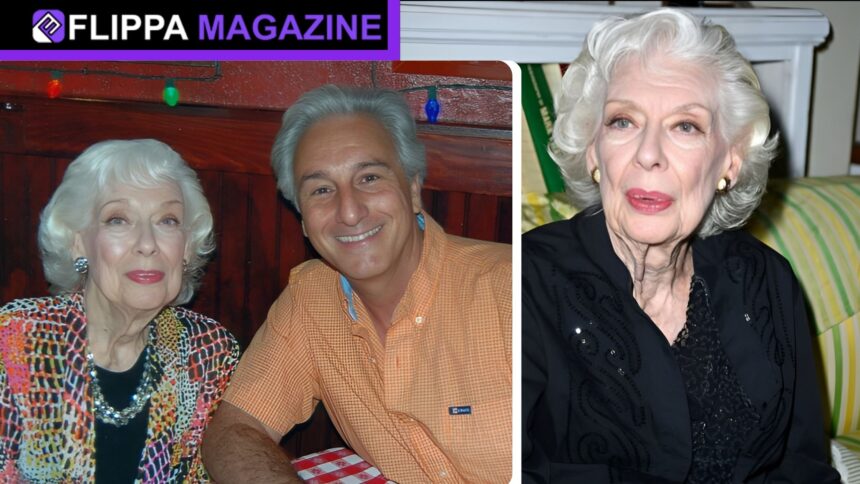In the history of American television, certain names shine with a timeless glow, and Joyce Randolph is one of them. Known best for her role as Trixie Norton in The Honeymooners, Joyce left an indelible mark on audiences who cherished the golden age of comedy. While her career gave her a lasting place in entertainment history, her legacy did not end on-screen. Instead, it lives on through her family, most notably her son, Randolph Richard. This article explores how Randolph has quietly and gracefully carried forward his mother’s memory, blending personal devotion with a respect for cultural heritage.
By looking into Randolph’s life, we uncover not only the private bond between mother and son but also the ways in which he ensures that Joyce Randolph’s influence remains alive. This journey offers readers a window into celebrity family dynamics, the enduring power of classic television, and the significance of legacy in American culture.
Quick Bio Table: Key Insights About Randolph Richard
| Aspect | Details |
|---|---|
| Full Name | Randolph Charles Richard |
| Relation | Son of actress Joyce Randolph |
| Birth Year | 1960s (exact date kept private) |
| Mother’s Legacy | Joyce Randolph, “Trixie” in The Honeymooners |
| Education | Well-educated, pursued private academic path |
| Profession | Built a professional career outside Hollywood |
| Public Presence | Lives a private life, avoids spotlight |
| Connection to Legacy | Actively preserves his mother’s memory |
| Family Values | Grounded in respect, tradition, and humility |
| Influence of Joyce | Inspired by her resilience and artistry |
| Current Role | Quiet custodian of family legacy |
.
A Legacy Rooted in Classic Television
To understand the significance of Randolph Richard’s role, one must first appreciate the impact Joyce Randolph had on American entertainment. Her portrayal of Trixie Norton was more than just comic relief — it captured the nuances of working-class women in mid-20th century America. This influence shaped Randolph’s upbringing, as he was raised not only by a mother but also by a cultural icon. Three elements stand out here: first, he grew up watching how his mother balanced celebrity with family life; second, he learned the discipline behind her craft; and third, he witnessed how audiences adored her long after the cameras stopped rolling.
The Private Nature of Randolph Richard
Unlike many celebrity children, Randolph Richard deliberately chose a path away from Hollywood. He cultivated a quiet, private life that emphasized personal achievement rather than public recognition. This decision reflects three aspects of his character: his preference for privacy over fame, his ability to create a distinct identity outside his mother’s shadow, and his subtle acknowledgment that legacy can be honored without constant media exposure. In doing so, he became a living example of humility — a trait Joyce herself valued deeply.
Carrying His Mother’s Memory with Grace
Honoring Joyce Randolph is not about grand gestures for Randolph Richard. Instead, it is reflected in everyday choices and family traditions. He ensures that her contributions to television are remembered in three ways: through personal family storytelling that passes down her experiences to younger generations, through involvement in small community acknowledgments or historical retrospectives, and through the preservation of personal memorabilia that ties directly to her life and career. Each of these actions demonstrates a form of quiet stewardship, keeping Joyce’s influence alive without commercialization.
The Influence of Joyce Randolph’s Values

Joyce Randolph was admired not just for her acting but for her resilience and grace. She lived through the shifting tides of Hollywood, remaining grounded in authenticity. For Randolph Richard, this translated into a strong framework for his own life. He absorbed three key lessons from her: perseverance in the face of challenges, respect for heritage and traditions, and the ability to value relationships over material success. These values, instilled during his upbringing, continue to guide the way he honors her memory.
Balancing Legacy and Individual Identity
One of the most fascinating aspects of Randolph Richard’s life is how he balances the weight of legacy with his own individuality. Many children of celebrities struggle with being defined solely by their parents’ fame, but Randolph handled it differently. He allowed Joyce’s legacy to enrich his personal history without letting it dictate his path. This balance can be seen in three ways: his pursuit of professional endeavors outside the entertainment industry, his ability to maintain long-lasting private relationships, and his decision to avoid the pressures of public validation.
Randolph Richard and Cultural Memory
The story of Randolph Richard is not only about family ties but also about cultural preservation. The Honeymooners remains a cornerstone of American comedy, and by keeping his mother’s memory alive, Randolph plays a subtle role in safeguarding this cultural heritage. His contributions are evident in three dimensions: by granting occasional insights to researchers or writers exploring his mother’s career, by participating quietly in events that honor classic television, and by maintaining a respectful presence whenever Joyce’s work is celebrated.
A Subtle Presence in Public Recognition
Although Randolph Richard does not seek the spotlight, his presence is sometimes felt in broader public tributes to Joyce Randolph. When retrospectives or obituaries highlight Joyce’s life, Randolph often ensures that the coverage reflects her truth with dignity. In this way, he operates in the background as a custodian of her image. His actions reflect three responsibilities: guarding her reputation, shaping public remembrance with accuracy, and ensuring that Joyce’s contributions are framed within their proper cultural context.
Lessons from a Mother-Son Bond

The relationship between Joyce Randolph and her son reveals the human side of celebrity families. While Joyce is remembered on-screen, she was also a mother who nurtured, disciplined, and inspired. Randolph honors her memory by cherishing three key aspects of their bond: their shared family traditions that transcended fame, the private moments of guidance she provided him away from Hollywood lights, and the resilience they built together in navigating public interest while maintaining private dignity.
The Broader Significance of Legacy
Randolph Richard’s story raises broader questions about how legacy functions in American culture. His approach illustrates that honoring a loved one’s memory can be done without constant media attention. It also highlights the balance between public heritage and private remembrance. These ideas manifest in three reflections: legacy is sustained through values as much as achievements, memory becomes meaningful when connected to personal action, and cultural history thrives when families continue to respect and preserve it.
Honoring Joyce Randolph Through Storytelling
One of the most enduring ways Randolph keeps his mother’s memory alive is through storytelling. Within the family circle, he shares anecdotes of Joyce’s experiences on and off the set, ensuring that future generations understand not just her fame but her humanity. This form of preservation takes three shapes: recounting stories of her early career struggles, describing her resilience as a woman in mid-century Hollywood, and celebrating her joys as a mother rather than solely as a public figure.
Tangible Reminders of a Lasting Legacy
While much of Randolph’s tribute lies in stories and values, he also treasures tangible reminders of Joyce Randolph’s life. In one paragraph worth noting, these include cherished photographs, handwritten notes, and mementos from The Honeymooners era. Each object tells a story, each photograph captures a moment, and each note preserves a fragment of personality. Collectively, these artifacts not only serve as a private memorial but also as potential contributions to cultural archives, should he ever choose to share them publicly.
Bullet Point Paragraph: How Randolph Keeps Her Memory Alive
Randolph Richard’s devotion to his mother’s legacy can be seen in small but meaningful gestures. For instance, he takes care to maintain her memorabilia with respect, attends select community events where Joyce’s contributions are remembered, and supports discussions of The Honeymooners when asked. These efforts may seem modest, but they create ripple effects: they preserve cultural memory, inspire others to revisit classic television, and show how personal devotion can honor a public figure without spectacle.
Final Thoughts: The Quiet Custodian of a Legacy
In the end, the story of Randolph Richard is not one of fame, but of devotion. While Joyce Randolph remains celebrated in television history, her son ensures that her memory is not confined to archives or reruns. He honors her through lived values, private remembrance, and subtle cultural preservation. His journey reminds us that legacies are not only sustained by the spotlight but also by the quiet, steady work of those who love and remember. In this way, Randolph Richard truly honors the memory of his mother, Joyce Randolph, while also exemplifying the importance of heritage, humility, and respect in American culture.
Frequently Asked Questions (FAQs)
1. Who is Randolph Richard?
Randolph Richard is the son of actress Joyce Randolph, best known for her role as Trixie in The Honeymooners. He lives a private life outside the entertainment industry.
2. How did Joyce Randolph influence her son’s life?
Joyce instilled values of resilience, humility, and respect for tradition. These lessons shaped Randolph’s personal and professional path, guiding how he honors her memory.
3. Did Randolph Richard pursue a career in Hollywood?
No, unlike many celebrity children, Randolph chose a career outside of Hollywood. He has maintained a private identity and avoided the pressures of public fame.
4. How does Randolph Richard preserve his mother’s legacy?
He honors Joyce by preserving memorabilia, sharing her stories within the family, and quietly supporting cultural recognition of her work in classic television.
5. What makes Joyce Randolph culturally significant?
Joyce is remembered as Trixie Norton in The Honeymooners, a groundbreaking sitcom that reflected working-class life and influenced generations of comedy.
6. Does Randolph Richard appear in public tributes to Joyce?
Randolph rarely seeks public attention, but he occasionally supports tributes or ensures that coverage of his mother’s life remains accurate and dignified.
7. Why is Randolph Richard’s approach to legacy important?
His story shows that honoring legacy does not require constant publicity. Instead, quiet devotion, respect, and storytelling can preserve memory just as powerfully.












